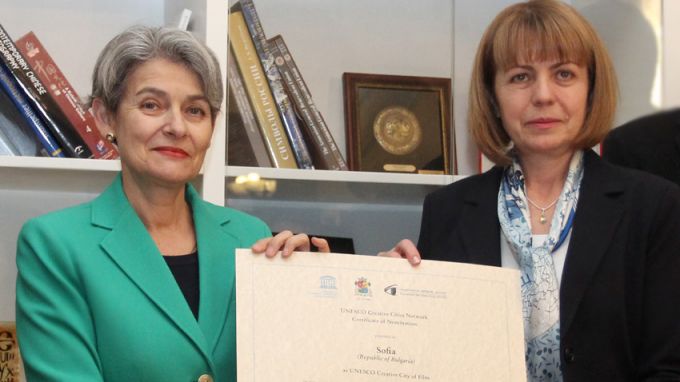
A meeting took place at the Ministry of Culture between Ms. Irina Bokova, UNESCO Director-General, and Bulgaria's Culture Minister Vezhdi Rashidov. Since 2009, for a second mandate, Bulgaria's Bokova is the highest-ranking official in this world organization. She is regarded as one of the possible future UN leaders. Minister Rashidov recalled that during her previous mandate a Regional Centre for the Intangible Cultural Heritage in Southeastern Europe was established in Bulgaria under the auspices of UNESCO. Most recently, the traditional Bulgarian carpets made for centuries in the town of Chiprovtsi via an ancient technology on a vertical loom, were included in UNESCO's intangible heritage. So far this country, a crossroads of civilizations over the centuries, has seven monuments of material culture on UNESCO's list, two natural and already three on the intangible heritage list. "Of course, as happy as we may be, we are also aware of our responsibilities and obligations to UNESCO," Rashidov said.
"The inclusion of the Chiprovtsi carpets in the intangible heritage list is a great success, a great joy for all of us. The most important thing is that we have plans for the future”, Irina Bokova noted. She came to Sofia to deliver to Sofia Mayor Yordanka Fandakova a certificate of the city's inclusion in another large network of UNESCO - the network of creative cities.
"Sofia is a city of cinema, it is a recognition of everything that has been done for the film industry and culture in a general plan in order to create a cozy urban environment. Also for stimulating the economic growth and of tourism, if you will", Irina Bokova added. "This is a large global network and Sofia became part of it. Not all cities that apply are included in it, we are talking about a very serious process of evaluation by experts. Sofia, however, went through this process and I am very happy that this thing is happening."
The meeting of the UNESCO Director General and Minister Rashidov was united around the theme "Culture as a vector of development - jobs, tourism, museums, and crafts". This is what Deyana Danailova in charge of international cooperation in the Ministry told Radio Bulgaria:
"It was concluded that we should reconsider existing policies in the field of culture and develop new strategies adequate to the present time. Also we must highlight the importance of culture in achieving the Millennium Development Goals. Repeatedly it was stressed that culture as an integrated sector, which covers the tangible and intangible heritage, cultural and creative industries, but also the entire cultural infrastructure, which supports the development and the presentation of the culture - all this leads to the achievement of sustainable development in terms of reducing poverty, gender inequality, promote social inclusion and last but not least – boost the creation of new jobs. Because statistics in recent years is a convincing evidence that perhaps in culture - one of the few areas in times of crisis that is generating jobs, demonstrates great growth at the expense of other industries."
English Rossitsa Petcova
Bulgaria participates in the exhibition "Art and Diplomacy", which was opened in a gallery on Broadway, with two canvases, the Bulgarian Consulate General in New York announced on Facebook. The exhibition is organized by the Society..
The truth is a blessing for those who are ready to go to the end. These words belong to author and screenwriter Svoboda Bachvarova, whose 100th birthday is celebrated on January 11. According to her, cynicism is the biggest blow to humanity. Fired..
The connection between Bulgaria, "Dali's Moustache" and Picasso is a topic that could remain widely discussed in the next few years, and perhaps even decades. The reason for this is not related to new technologies and artificial intelligence, nor to..

+359 2 9336 661
